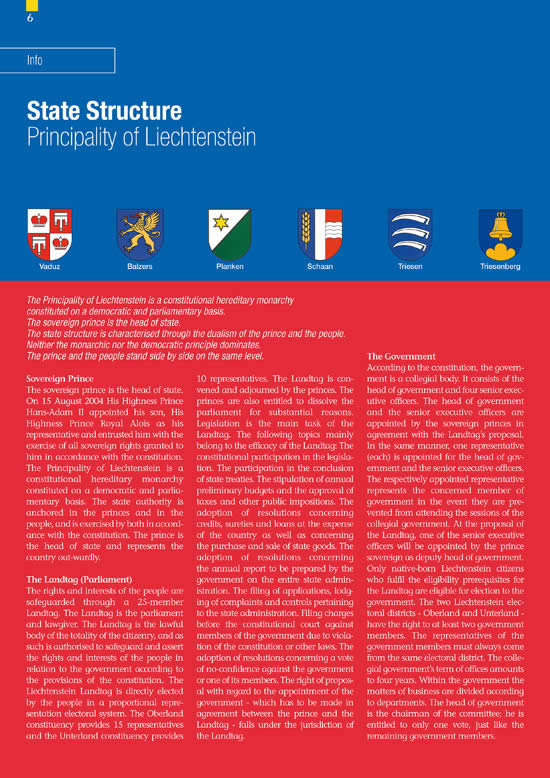 State Structure
Principality of Liechtenstein
State Structure
Principality of Liechtenstein
The Principality of Liechtenstein is a constitutional hereditary monarchy
constituted on a democratic and parliamentary basis.
The sovereign prince is the head of state.
The state structure is characterised through the dualism of the prince and the people.
Neither the monarchic nor the democratic principle dominates.
The prince and the people stand side by side on the same level.
Sovereign Prince
The sovereign prince is the head of state. On 15 August 2004 His
Highness Prince Hans-Adam II appointed his son, His Highness Prince
Royal Alois as his representative and entrusted him with the exercise
of all sovereign rights granted to him in accordance with the
constitution. The Principality of Liechtenstein is a
constitutional hereditary monarchy constituted on a
democratic and parliamentary basis. The state authority is anchored in
the princes and in the people, and is exercised by both in accord-ance
with the constitution. The prince is the head of state and represents
the country out-wardly.
The Landtag (Parliament)
The rights and interests of the people are safeguarded through a
25-member Landtag. The Landtag is the parliament and lawgiver. The
Landtag is the lawful body of the totality of the citizenry, and as
such is authorised to safeguard and assert the rights and interests of
the people in relation to the government according to the provisions of
the constitution. The Liechtenstein Landtag is directly elected by the
people in a proportional repre- sentation electoral system. The
Oberland constituency provides 15 representatives and the Unterland
constituency provides 10 representatives. The Landtag is con-vened and
adjourned by the princes. The princes are also
entitled to dissolve the parliament for substantial reasons.
Legislation is the main task of the Landtag. The following topics
mainly belong to the efficacy of the Landtag: The constitutional
participation in the legislation. The participation in the conclusion
of state treaties. The stipulation of annual preliminary budgets and
the approval of taxes and other public impositions. The adoption of
resolutions concerning
credits, sureties and loans at the expense of the country as well as
concerning the purchase and sale of state goods. The adoption of
resolutions concerning the annual report to be prepared by the
government on the entire state admin-istration. The filing of
applications, lodg-ing of complaints and controls pertaining to the
state administration. Filing charges before the constitutional court
against members of the government due to violation of the constitution
or other laws. The adoption of resolutions concerning a vote of
no-confidence against the government or one of its members. The right
of propos-al with regard to the appointment of the government - which
has to be made in agreement between the prince and the Landtag - falls
under the jurisdiction of the Landtag.
The Government
According to the constitution, the government is a collegial body. It
consists of the head of government and four senior exec-utive officers.
The head of government and the senior executive officers are appointed
by the sovereign princes in agreement with the Landtag’s proposal. In
the same manner, one representative (each) is appointed for the head of
gov-ernment and the senior executive officers. The respectively
appointed representative represents the concerned member of government
in the event they are pre-vented from attending the sessions of the
collegial government. At the proposal of the Landtag, one of the senior
executive officers will be appointed by the prince sovereign as deputy
head of government. Only native-born Liechtenstein citizens who fulfil
the eligibility prerequisites for the Landtag are eligible for election
to the government. The two Liechtenstein electoral districts - Oberland
and Unterland - have the right to at least two government members. The
representatives of the government members must always come from the
same electoral district. The collegial government’s term of offices
amounts to four years. Within the government the matters of business
are divided according to departments. The head of government is the
chairman of the committee; he is entitled to only one vote, just like
the remaining government members.